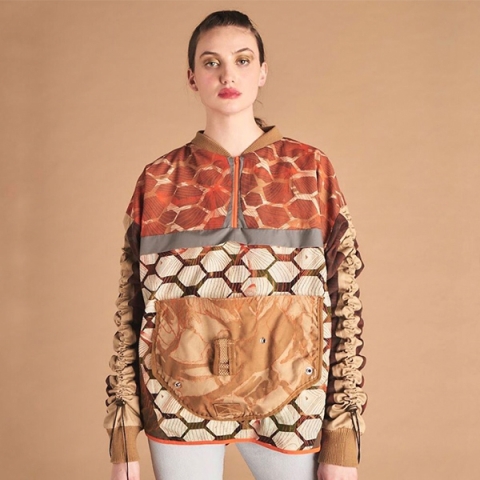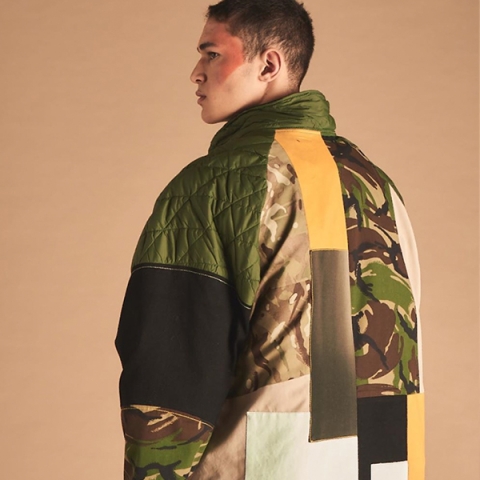

Do we need a revolution to address the environmental impact of fast fashion?
7 min read
Fashion and textiles are relevant to everybody. Our clothes, bedding and furniture are a part of our daily lives. But 60% percent of clothes are made from plastic-based materials. Do we need a revolution to address the environmental impact of fast fashion?
Take a moment to look at the labels in the clothes you’re wearing. What material are your clothes made from? It’s likely that some of the items you’re wearing contain a blend of synthetic plastic-based fibres such as polyester, nylon or polyamide. Plastic is not only in the fabric itself but in buttons, threads, zips and embellishments.
Everything from underwear and sports kits to wedding dresses and trainers contain plastics. Approximately sixty five percent of all fibres in clothing is polyester and the vast proportion of that is virgin polyester.
Throughout their lifecycle such textiles contribute to the worldwide plastic pollution crisis. Synthetic materials shed microplastics while we’re wearing and laundering clothes, and then again through their reprocessing or degradation in landfill or the oceans.
And it’s not just the garments themselves. Their packaging, hangers and transportation also contribute to fashion’s environmental footprint.
Consumers want to reduce plastics in clothing
Recent evidence shows that the public wants action to address fashion plastics. Three quarters of people surveyed want to see fewer plastics and petrochemicals used in the production of clothing, according to the Royal Society of the Arts’ (RSA) Turning the tide: Public attitudes to plastics and fast fashion, published in March 2021.
The report also revealed a large awareness gap. Two thirds of respondents said they tried to reduce the amount of plastic they're using in their daily life, such as packaging, yet a third responded that they would regularly buy clothing that contains synthetic fabric.
These statistics don't tally with the amount of synthetic fibres produced and purchased either. Synthetic fibres account for sixty nine percent of all textile production worldwide — a number which is set to rise without intervention over the next decade. Fast fashion relies on cheap fabrics, which will have a high percentage of synthetic fibres, to keep prices low.

Synthetic fibres account for 69% garments produced worldwide.
Fast fashion relies on such materials to keep prices low.
Redesigning the future of fashion and textile design
As part of the University’s Revolution Plastics initiative, we're taking an interdisciplinary approach to develop sustainable fashion and textile design. Our PO1 project, named after the Portsmouth postcode, looks to address textile waste issues in the local area.
The project is currently in its first phase, focussing on research informed education. We put our students at the heart of the responsible design process, exploring options to design durability into textiles, along with possibilities for repair, remaking and upcycling.
The PO1 project began when our students studying BA (Hons) Fashion and Textile Design were called upon to create garments using worn or obsolete military uniforms donated by a local Portsmouth-based charity. Much of the donated material was one hundred percent polyester or polyester blends. Our students tackled this through deconstruction of those items, pattern cutting adapted for upcycling and using overdyeing and overprinting methods to create fashion pieces. The resulting designs were desirable outerwear garments, which embraced a low wash or no wash solution to minimise the shedding of microplastics.

Upcycled design by Melissa De Beer.
Photo © David Clark.

Upcycled military uniform designed by Alex Sincaru. Photo © David Clark
Student-led sustainable design
Design-led upcycling encourages our students to be critical and reflective of the design process. We’re training designers but those designers are also citizens and consumers; we're trying to educate the whole person. Design-led upcycling is a fundamental shift in our approach to teaching fashion and textile design, encouraging learners to notice and value waste at all stages of the product life cycle.
Our students have been really successful with the designs they've produced. Rebecca Powell was awarded the Draper’s Sustainable Graduate Fashion Award in 2020. Rebecca repurposed waste plastics to create new textiles for a fashion collection which makes a powerful statement about the impact of plastic pollution.
We're also exploring design options using bioplastics. Molly Huntington, a 2020 graduate, developed a bioplastic in an easy to disassemble modular fashion garment. The bioplastic is designed to look like honey, but it's also impregnated with flower seeds so when it decomposes, it will support bee populations. Molly creatively proposes a new version of fast fashion. The bioplastic won't last for very long so it's a trend lead approach. It's about thinking critically about the fast fashion system but in a way which can reduce its impact.
Many of our students continue to reuse plastic and textile waste within their designs, which will be showcased at Graduate Fashion Week in London in June 2021.
Follow us on Instagram to see the latest designs and updates from BA (Hons) Fashion and Textile Design.
Watch Molly Huntington's 2020 bioplastic collection
Bee the Change by Molly Huntington
This collection is inspired by bees and their importance as the most productive pollinator of all insects. Molly created an environmentally friendly fabric that, when at landfill, will biodegrade to expose glucose and flower seeds that will provide a valuable source of food for bees. The bioplastic used here is home-brewed and can be coloured, boiled and re-sculpted. The fabric mimics bees' skin and the bubbly appearance of honey. The wearer is satisfied knowing the collection will grow with the environment after its product life.
Video with music (no dialogue) showing models posing in the 'Bee the Change' fashion collection designed by BA Fashion and Textile Design student, Molly Huntington.
Fashion Revolution Week
We're joining a global Fashion Revolution to reduce the environmental and human costs of making our clothes.
Fashion Revolution Week is an annual event that commemorates the Rana Plaza factory collapse in 2013, which killed 1,134 people in Dhaka District, Bangladesh. It has become the world’s largest fashion activism movement, mobilising citizens, industry and policymakers through research, education and advocacy.
To support Fashion Revolution Week, we're hosting events looking at the impact of the fashion industry.
